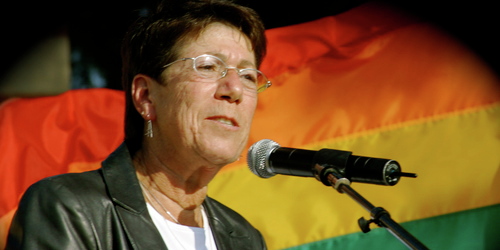BY AJ TRAGER

ANN ARBOR – LGBT rights activist Ronni Sanlo, Ed.D., will return to Ann Arbor May 26 for a screening of "Letter to Anita," a memoir of Sanlo's life featuring Hollywood star Meredith Baxter.
In the mid-90s Sanlo came to work for the University of Michigan Spectrum Center, but her activism started more than a decade earlier. Sanlo married in 1971, despite knowing her sexual orientation at the age of 11, because, according to her website, she didn't want her family to think she was different from them.
In 1977, two years before Sanlo came out as a lesbian, celebrity singer Anita Bryant led the Save Our Children campaign, the first organized opposition to the gay rights movement. The Save Our Children campaign ultimately led to the repeal of a Miami ordinance that banned discrimination based on sexual orientation in housing, employment and public accommodation.
Following the repeal of the Miami Gay Rights ordinance, the Florida Legislature created an anti-gay parenting law in honor of Bryant, which caused Sanlo to lose custody of her young children, then ages 5 and 7. At the time of the decision, she had limited visitation and eventually had none. Her son and daughter were told that they would contract AIDS from their mother and became too frightened and refused visitation.
"I had this intense sense that there was nothing more that anybody could do to hurt me. That the worst thing that could've happened happened," Sanlo told BTL.
Sanlo was hired by the Florida Health Department as an HIV epidemiologist which allowed her to obtain a masters and a doctoral degree in education from the University of North Florida. She moved to Ypsilanti directly following her graduation and was hired as the first director of the Spectrum Center, then known as the Lesbian and Gay Male Programs Office.
University of Michigan Spectrum Center
The University of Michigan LGBT office operated with coordinators, or "Human Sexuality Advocates," for 23 years prior to Sanlo's entrance. Jim Toy, the first openly gay man in Michigan and founder of the center, and Cindy Gair worked for the center beginning in the early '70s. Through their leadership, the office developed speakers' bureau "raps" in classes and with residence hall personnel; increased outreach and services to bisexual people and people of color; set up a system of peer advisors to speak with the counseling office and aided in training them about how to best counsel lesbian and gay individuals; and created a framework of justice that sought to add community concerns to the center's curriculum. In 1994 the U of M administration reduced the two positions to one position. Toy stepped down and Sanlo was hired.
"I was the first person around the country to have the title of director (of an academic LGBT office). I think there were only four other university programs, and the people that ran those programs were called coordinators. Michigan took the leap and really upped the ante on the position – which I thought was brilliant," Sanlo explained.
Over the course of the next 3.5 years Sanlo added bisexual and transgender to the organization's name. Sanlo explained that when she took the position, she didn't understand what bisexuality really was and "had the same ridiculous idea that everyone else had" about bisexuality. A bisexual staff member at the center spent time educating Sanlo on bisexuality and what it meant to be bisexual. Once the B was added into LGB, more students started coming to the center who identified as bisexual.
"With transgender, I never even thought about the idea. Not once in my entire life did I think about it until I got a letter from a student in January of 1996. I thought he was this adorable gay man. He was studying abroad the second semester," Sanlo said. The student explained in the letter that she felt welcomed into the center's space as a gay male but never heard the word trans.
"I felt so horrible that she, as a trans person, felt she couldn't come to me. I didn't give any indication of acceptance. I did everything I could to help her come back to school the way she is," Sanlo explained. "It wasn't enough to say trans people were welcome. I had to do a lot of work to find out what kind of services my shop could provide for trans students, faculty and staff."
When Sanlo left the University of Michigan in 1997 the organization was known as the Office of Lesbian, Gay, Bisexual and Transgender Affairs.
During her tenure at U of M, Sanlo also created Lavender Graduation, an annual campus ceremony to honor and acknowledge the achievements of LGBT and ally students.
"I did that because students kept saying they can't wait to get out of school. I felt badly that they felt that the institution didn't care about them, so I wanted that final taste of their experience to be positive. And that they and the scholarship mattered," she said.
Through the advocacy of Toy and a study committee on the status of lesbians and gay men published in the 1991 Lavender Report, the U of M Board of Regents added sexual orientation into the university bylaws in 1993. As a result, the LGBT office conducted many trainings for university faculty and staff on HIV/AIDS and LGBT cultural competency and education. Much was changing at the university at the time with the integration of same-sex spousal rights and domestic partner benefits.
Sanlo published her first book, "Working with Lesbian, Gay, Bisexual, and Transgender College Students: A Handbook for Faculty and Administrators," in 1998 following her experiences working at U of M.
'Letter To Anita'
Letter to Anita" was created out of Sanlo's memoir, "Purple Golf Cart: The Misadventures of a Lesbian Grandma." The work includes a collection of essays about different parts of her life experience including a letter to Anita Bryant which she wrote many years after the 1977 Save Our Children Campaign that greatly impacted her life.
"I wrote the letter much later. I harbored so much anger. I needed to have a way to touch the anger and work on it and writing it was a way to do that," Sanlo explained.
A good friend and filmmaker read "Purple Golf Cart" and was so moved from the letter to Anita Bryant that she determined Sanlo's story was going to be her next film project.
"Getting in front of the camera was hard enough, but the entire filming process was difficult. It was the first time I remembered thinking about all this stuff. It wasn't scripted – that was a challenge," she said.
Filming took a year and a half as Sanlo and director Andrea Meyerson traveled across the country to interview people from Sanlo's past.
Sanlo reunited with her two children when they both turned 22, more than 15 years after she last saw them. She connected with her daughter, who at the time was living in Ohio, when she worked in Ann Arbor; she reconnected with her son a few years later after moving to California to work for UCLA. Her son was disowned by his father after coming out as gay and subsequently lived with her for a year in Los Angeles.
Today she maintains a relationship with her children and is a supportive grandma to multiple grandchildren. She continues to do work on college campuses, presents keynote addresses at Lavender Graduations, helps compile dissertations, sits on dissertation committees and has started to work on a screenplay. Sanlo currently lives in Washington state with her partner, Kelly Watson.
Event Info
The award-winning documentary "Letter to Anita" will be presented May 26 at the Michigan Theater. A special VIP reception at 5:30 p.m. includes refreshments and a meet-and-greet with Sanlo, Toy and Honorary Event Chair Ingrid Sheldon, former mayor of Ann Arbor. Ryan Cowmeadow from the Area Agency on Aging 1-B will emcee. "Letter to Anita" will begin at 7 p.m. but is preceded by a performance by George Bedard and the Kingpins beginning at 6:30 p.m.
"'Letter to Anita' will inspire people of all gender identities and sexual orientations to seek to remedy injustice and discrimination by every possible means of education and advocacy for universal human and civil rights," says Toy. "As an aging gay man, I become more and more conscious of the interconnections among the individual threads of my 'identity tapestry.'Elderly people in this country are often isolated, disregarded and neglected… If we are members of a racial minority or a sexual minority, we are at increased risk of injustice."
The film screening is organized as a fundraiser by "Big Hearts for Seniors," a group that promotes awareness and raises funds for five nonprofit, community-supported programs of the University of Michigan Health System serving older adults throughout Washtenaw County.
General admission tickets cost $15 and can be purchased at the door or online at http://www.med.umich.edu/geriatrics/BHS. VIP tickets cost $50 and must be purchased online before the day of the showing.
The Michigan Theater is located at 603 E. Liberty St., Ann Arbor.
Learn more
https://en.wikipedia.org/wiki/Save_Our_Children
http://www.ronnisanlo.com/about.htm
https://spectrumcenter.umich.edu/article/our-history










